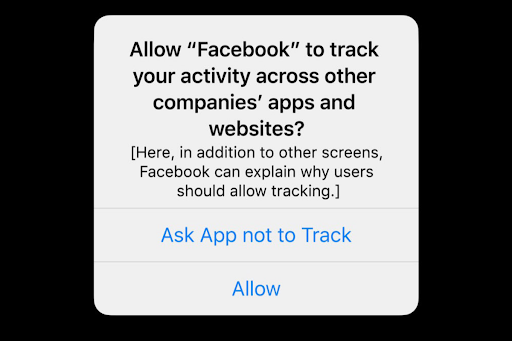With the release of iOS 14 for iPhones, Apple is cranking up its war on personalised advertising. The result is likely to hurt your business, along with millions of businesses around the world.
Apple’s recently released iOS 14 requires that any app that wants to track users’ activity when clicking on links, gets explicit permission to do so. A popup appears asking for permission to track activity and then gives the options of “Ask App Not To Track” or “Allow”.
The mandatory wording in the popup is a little sinister. In Facebook the popup says, “Allow Facebook to track your activity across other companies’ apps and websites?” That sounds a little creepy, and is very deliberate by Apple. They could have instead chosen to use wording that explains the benefits, such as, “Facebook would like to use tracking to show ads that you’re likely to be interested in.”
The changes are being made to increase the privacy of iPhone users, but there are downsides for users, publishers and businesses.
Downsides for Users
I’ll admit, it’s a bit mind-boggling to think about how much Facebook and Google know about us. Nearly everything we do online is tracked. Considering how much time we spend on social media, websites and working online, there is a lot of data about us. The key reason these companies track everything they can is to provide personalised advertising to us.
The ads I see when scrolling through Facebook or Instagram will be different to the ads you see. They are crafted based on my interests and things I’ve responded to in the past.
This in itself is the biggest downside users will experience if they opt-out of tracking. Personalised advertising means that the ads in your news feed feel useful – they are generally about things that you’re likely to be interested in.
Personally, I enjoy having advertising that is personalised to the things I’m interested in. I have found numerous books, software, articles and products while browsing Facebook and Instagram that I wouldn’t have found without personalised advertising. I’ve purchased some great products that I love using or reading, and have found interesting thought-leaders to follow, all from Facebook ads. Opting out of tracking would stop me from discovering a lot of these.
But there’s another aspect of personalised advertising that is just as important – that is, to know when to STOP showing ads to people.
You may have noticed when viewing a product online, if you don’t purchase it, you’re likely to start seeing adverts for that product. That’s called “remarketing”. If you then purchase that product, those ads should stop being shown to you.
For users who opt out of tracking, the advertiser won’t have any tracking data to show that you have purchased the item. So that product will keep being shown to you again and again.
These are the downsides users will experience if they choose to opt out. I personally prefer to have ads that are personalised to things I’m likely to be interested in, so am happy to tap “Allow” for Facebook to track my activity.
Downsides for Publishers
App and website publishers who rely on advertising to monetise their business are likely to have their income severely impacted by these changes. With ads being less personalised, users are far less likely to click on them, and ad clicks are how publishers earn revenue.
Experiments have shown that publishers experienced more than 50% drop in revenue when personalisation was removed from campaigns.
To overcome this, many free apps that rely on advertising for their income are likely to change to the in-app purchases model to monetise their business. So if you have free apps or games that have ads included, expect to be prompted with paid upgrade prompts in the near future. (This of course will help Apple increase their profits even further … clever move by Apple!)
Downsides for Businesses
The huge downside for businesses is that online advertising is likely to become more expensive to get the same results, due to ads being less targeted than they are now.
Not all targeting will disappear. Users who opt out of Facebook being able to track their activity on other websites will still be shown ads based on their activity inside of Facebook. But the ability of Facebook to find the users most likely to be responsive to your ad or offer is going to be significantly impacted.
For example, if you were a start-up business launching a photography related product, Facebook and Instagram ads are a great way to get in front of people interested in photography. But with a limited ads budget for launching your product, do you want to show your ads to everyone that is interested in photography pages on Facebook, or would you prefer to show you ads to people who are interested in photography AND have a history of purchasing photography products? Which would give you the best chance of launching successfully and turning your business into a success? Definitely the later.
It’s the same if you had an ad campaign promoting a free ebook. Do you want to show your ad to people who click on lots of ads but never download the offer? Or would you prefer to show it to people who have a history of clicking and then downloading?
That’s what Facebook and Instagram tracking enables. It means that businesses around the world can reach people who are most likely to be interested in what they’re offering AND most likely to take action.
The way the tracking currently works is that Facebook’s pixel tracks what happens after users click on an ad. Does the user click to the next page in the process? Do they end up downloading the ebook or purchasing a product? Using this data Facebook can match the ads we see with the content or products we are most likely to be interested in.
Then once users have purchased, we can stop showing the ads to them – or better yet, show them a different ad for another product they might like. Or, for longer sales cycles, show them ads for the next step in the sales journey with you.
But with the new restrictions in iOS, businesses are going to end up with a lot more wasted ad spend.
Whether your business sells products online or generates customer enquiries and sells offline, if you use Facebook ads, you’re likely to see a significant reduction in the performance of your ad campaigns. Without Facebook being able to measure what users are most interested in purchasing, the targeting of the campaigns becomes less effective. This means if you used to get a certain amount of sales or leads by showing your ads to 10,000 people, you’re likely to need to show those ads to 25,000 people to get the same result.
It is also going to make it much harder to know the true performance of the ad campaigns. At the moment there is clear measurement of the numbers of leads or the amount of sales revenue that comes from each ad and campaign. With iOS blocking a lot of this data, businesses are going to have to estimate a lot more about the actual return on investment that their campaign has produced.
Facebook’s response to Apple’s changes with iOS is still a fast developing subject. The full consequences and impact of these changes are not yet clear, but you can guarantee that the team at Facebook are working very hard to keep their platform as one of the most powerful forms of advertising available, helping connect businesses with their potential customers.
In the meantime, if you prefer to see ads you’re interested in, when you see the popup just click “Allow”.









